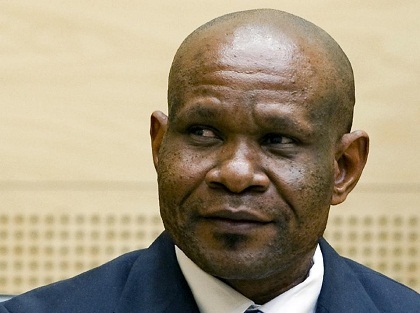ICC Acquits Congo Ex-Militia Boss Ngudjolo Chui on Appeal

The International Criminal Court on Friday upheld the acquittal of Congolese ex-militia leader Mathieu Ngudjolo Chui who had been freed more than two years ago in a trial on war crimes charges.
"The appeals chamber by majority confirms the acquittal and rejects the (prosecution) appeal," Judge Sanji Mmasenono Monageng told The Hague-based ICC, the world's only permanent war crimes tribunal.
Ngudjolo, 44, is a former leader of the Nationalist Integrationist Front (FNI) militia in eastern Democratic Republic of Congo and his acquittal in December 2012 was a first for the ICC.
Judges said at the time that prosecutors had failed to prove his commanding role in a 2003 attack by ethnic Lendu forces on Bogoro village in the vast country's restive northeast Ituri region in which more than 200 villagers were slaughtered.
Ngudjolo had faced charges including using child soldiers in the horrific ethnically motivated attack. Many of the victims of the opposing Hema group were burnt alive, and babies were smashed against walls, while women were raped and abducted as sex slaves.
Prosecutors subsequently appealed.
Monageng on Friday upheld the trial chamber's verdict, although she criticized its judges for not allowing prosecutors to use information from Ngudjolo's telephone conversations while in detention.
Prosecutors wanted to cross-examine Ngudjolo about the calls, alleging they were made to intimidate witnesses and to influence their testimony.
Overall, the trial judges' decision not to include the evidence had not "materially affected the acquittal", the judge said.
Monageng also found "unpersuasive" the prosecutors' argument that the trial judges had disregarded specific evidence to show that Ngudjolo commanded the attack on Bogoro.
The judge agreed the evidence was "too general" to determine Ngudjolo's role.
Ngudjolo, who is awaiting a decision on an asylum application in the Netherlands, sat with his hands folded in front of him, listening intently as the verdict was read.
Dressed in a charcoal suit, light shirt, blue tie and wearing a silver crucifix pinned to his jacket, he afterwards smiled and shook his lawyers' hands.
A lawyer representing more than 350 victims and their families lamented the decision.
"Today's judgment reopens the grieving (process) for many victims," Fidel Luvengika Nsita said.
"It's because of technicalities that we've arrived at this result. It's a pity, when searching for the truth," he told reporters outside the ICC's fortress-like building.
Human Rights Watch said the appeals judgment "emphasized the prosecutor's weak case", calling on it to continue to improve the quality of its investigations.
A deserter from the army of the former Zaire in 1996, Ngudjolo later became a leader in the FNI, prosecutors alleged.
His fellow inmate Germain Katanga was sentenced to 12 years for his role in the Bogoro attack after judges split their trials.
Their main adversary, former militia leader Thomas Lubanga, was in 2012 jailed by the ICC for 14 years for using child soldiers in his own rebel army.
In 2003, DR Congo was just starting to emerge from a war that embroiled the armies of a half-dozen nations, and the isolated east was rife with rival militia groups.
Clashes in Ituri broke out in 1999, including between the pastoralist Hema and the Agricultural Lendu, devastating the region and leaving some 60,000 dead, according to non-governmental group estimates.



